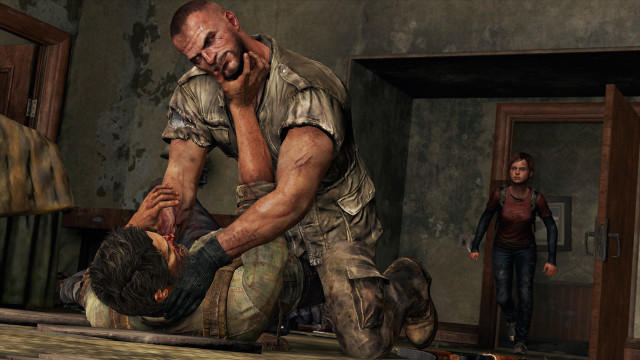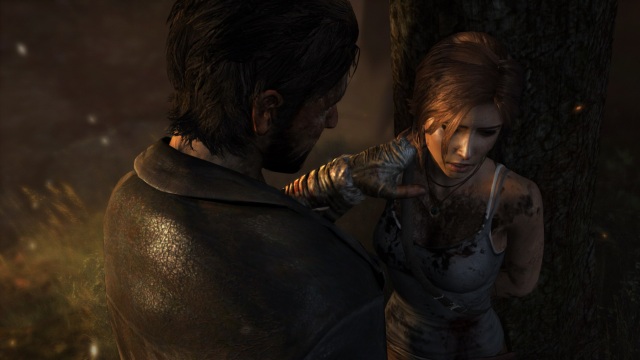The Story Mechanic Part One: Do We Care?
They think we are all idiots. With attention spans like two years olds and the memories of ditzy fish.
Worst of all, they think that we don’t care about stories any more.
E3 2012 has come and it has gone and, if we have learnt anything, it is that the majority of game publishers think that gamers can be won over by bloody firework displays, neon dance numbers and an orgy of shiny technological gimmicks. Demonstration followed demonstration, each bloodier and shallower than the last. Few games were presented without a heavy focus on violent dismemberment or bloody explosions. Even fewer did anything more than hint at the story they wanted to tell.
It made the end of the console cycle play out like the last days of a porn star’s career; over-produced and lacking any morals, the producers sinking to the lowest, sleaziest displays in order to keep our eyes focussed on them for just one…more …year …
Or are they right?
The feeling that increasingly nags at me is that they might be. That actually, for all the efforts of Quantic Dream, Naughty Dog and Irrational Studios, gamers don’t care about the details. We don’t care about the stories. We just do what the producers want, happily grimacing at the violence, whooping at the explosions and smiling emptily like lobotomised children at the flashy set pieces.

So now the important question; do gamer’s care about stories?
Nintendo and Microsoft certainly didn’t seem to think so. Both were pushing new hardware. Nintendo had Wii U to explain and Microsoft had business synergies to think about (don’t worry Xbox, the thank-you card from the Windows 8 Tablet is in the post). Nintendo’s game demonstrations were explanatory, Microsoft’s inexplicably vague and brutally loud. Only occasionally did a demo hint at a new premise. Hardly any discussed their characters; what they are feeling or what the designers want us to feel; the narrative arcs that will define the experience. Most were just a blitzkrieg of explosions and throat stabbings. Creativity and narrative were smothered by a pillow of “cool” gameplay moments and slickly produced trailers and then, stabbed viciously in the throat.
There was nothing to explain the type of stories that players can expect with their games over the next twenty four months.
The publishers might have felt they were giving us what we want.
Microsoft opened their show with Halo 4 and closed it with Call of Duty: Black Ops 2 and, despite turning the speakers up so loud that lights dimmed across Los Angeles, the hollering and cheering from the audience often drowned the din of gunfire. These trailers weren’t picked for no reason. The publishers picked these thunderous vignettes because they believe that gamers just love saying “wow”. The sales of those franchises certainly supports their point of view. Top selling games seem to be saying to the hardware manufacturers that moments that make players say “wow” is enough.
Equally, the post-E3 internet has been ablaze in the wake of the Hitman and Tomb Raider trailers, proving once and for all that there is no such thing as bad publicity and even if it means hugely mis-representing your games, that presenting the crudest or edgiest content in the most unsubtle way makes sure that all eyes stay on you. The wonderful gaming stories of E3, the XBLA gems, the great new stories, buried under the slurry of a million blog posts about slutty nuns and ‘will they, won’t they’ rape scenes.

So, back to the opening question: do gamers actually care about stories in games anymore?
God I hope so. Or this column is going to have a run shorter than the first X-Wing to do the Death Star trench run.
You see, I believe that we do care about story. Because top quality console and PC experiences should be more than pyrotechnic fluff that lives on our TVs for a moment and our memories for even less. A dig through the graveyard of my gaming memories turns up feeling of loss at Aeris’ death, of elation when Ico catches Yorda, and my heart hammering through my chest as the Horsemen rode across the sky to stand with War. If you have ever played games, you will share moments like this. Brilliant moments, when games truly connect with us and thrill us, rather than just shock us with sprays of claret. When story and character grabbed us and wouldn’t let us go.
Game genre’s and gameplay mechanics will come and go, trends work that way. But the human desire to make sense of chaos will never leave us. That is why story should matter so much more than the hardware manufacturers and publishers seem to think it does. For the last thirty years, game designers have been wowing us with gameplay and graphical innovations. We’ve seen bullet time, cover mechanics and online gameplay. Game designers deserve nothing but praise for turning Return to Castle Wolfenstein into Call of Duty: Modern Warfare 3. For being able to iterate the still-perfect Super Mario World and mould it into the equally perfect but wonderfully different Super Mario Galaxy 2. But, for all the evolution, we are still shooting people and collecting coins. As this hardware cycle ends, improving graphics has become a process of eking out extra frames and providing subtle polish to textures. There was an opportunity to innovate with new narrative techniques; an opportunity that wasn’t just just exciting, but downright cost effective. Instead, the hardware manufacturers put set-pieces and technology front and centre. After E3 there was a sense of disappointment. I believe this is one of the reasons why.

That is why I believe it because of how the gaming community has rallied around Quantic Dream’s new game, Beyond: Two Souls. Its trailer treated us all like adults, giving us a glimpse into setting and character. It was a (largely) quiet trailer that drew the audience in slowly, but the response was as loud and uproarious as any bombastic super sequel trailer. It is Quantic Dream’s reputation as master storytellers that caused the excitement. Cage’s team were setting a standard for the rest, proving that they can make things explode but that they can also provide the depth to back it up. Quantic Dream had the confidence to make us wait. They trusted that an audience, if you tell them a good enough tale, would stay interested. They were right. The trailer was, in reality, little more than a teaser; no gameplay was shown. Player’s were thrilled and excited nonetheless. Almost as important, we proved that we were happy to wait for two or three minutes before a single gun is fired or helicopter explodes.
You see, gamers do care about story.
And that is hugely important for this column. This is a space to discuss the importance of story and narrative in games. Gamers care about stories and while story is no more important for games than the technology that drives the industry or the gameplay innovation that fuels it, great tales and innovative narrative design deserve the virtual column inches that seem to be denied them at every turn. So here we are. I believe we do care, and that publishers believe we don’t. This is our little corner of the internet, where we can prove them wrong.
Welcome to The Story Mechanic. I’ll see you soon.





